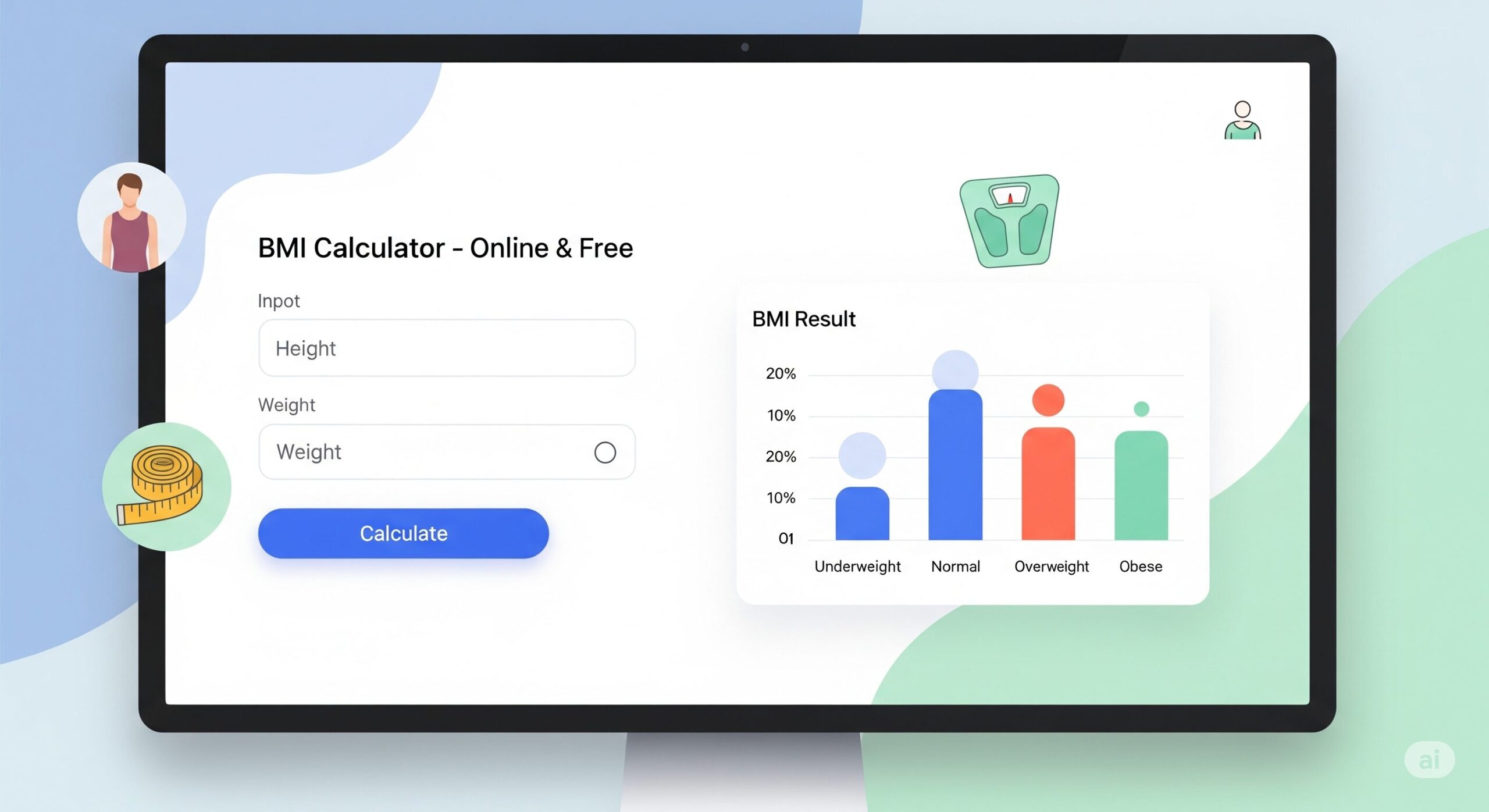Use our free online BMI Calculator to check your body mass index instantly. Find out what your BMI results mean, discover your ideal weight range and start your health journey today with our accurate and easy-to-use tool.

Your First Step to a Healthier You: The Ultimate Guide to Our BMI Calculator
In a world filled with complex health advice and confusing diets, understanding where you stand with your weight can feel overwhelming. What if you had a simple, science-backed starting point? A number that could give you a quick snapshot of your body composition and help you begin a meaningful conversation about your health?
That’s precisely what the Body Mass Index, or BMI, offers. And now, you can get that number in seconds.
Welcome to the most comprehensive guide to understanding your body. This page features our powerful, free, and incredibly easy-to-use BMI Calculator. We designed this tool not just to give you a number, but to empower you with the knowledge to understand it. Whether you’re curious about your health, setting new fitness goals, or simply want a reliable way to track your progress, you’ve come to the right place. Dive in to discover everything you need to know about BMI and take the first, crucial step on your wellness journey.
Your Instant Answer: How to Use Our Free Online BMI Calculator
We believe that powerful tools should also be simple. Our BMI Calculator is designed for a seamless experience, giving you accurate results without any hassle. Here’s how to get your personalized reading in under a minute:
- Select Your Preferred Unit System: Our tool caters to users worldwide. Choose between Metric (kilograms and centimeters) or Imperial (pounds, feet, and inches). The input fields will adjust automatically.
- Enter Your Height:
- For Metric, input your height in centimeters (cm).
- For Imperial, enter your height in feet (ft) and inches (in).
- Enter Your Weight:
- For Metric, input your weight in kilograms (kg).
- For Imperial, input your weight in pounds (lbs).
- Click “Calculate BMI”: With a single click, our algorithm instantly processes your information.
That’s it! Your results will appear immediately below the button, presenting you with:
- Your BMI Score: A clear, precise number.
- Your BMI Category: A color-coded classification (e.g., Normal weight, Overweight) for quick interpretation.
- A Visual BMI Gauge: A helpful visual scale showing where your BMI falls on the spectrum.
- Your Healthy Weight Range: An invaluable feature that calculates the ideal weight range for your specific height, giving you a tangible goal to work towards.
What Exactly is Body Mass Index (BMI)?
Body Mass Index (BMI) is a measure that uses your height and weight to work out if your weight is healthy. It was developed in the 19th century by a Belgian mathematician named Adolphe Quetelet and has since become a globally recognized screening tool for both individuals and large populations.
Essentially, BMI is a simple mathematical formula that provides a score. This score is then used to categorize someone as underweight, normal weight, overweight, or obese. It’s important to understand that BMI is a screening tool, not a diagnostic tool. As the World Health Organization (WHO) explains, BMI is the most useful population-level measure of overweight and obesity as it is the same for both sexes and for all ages of adults. However, it should be considered a rough guide because it does not account for the composition of the body, such as muscle versus fat.
Think of it like the “check engine” light in your car. When it turns on, it doesn’t tell you exactly what’s wrong, but it signals that it’s time to look under the hood and possibly consult a professional. Similarly, a high or low BMI score suggests that a deeper conversation with a healthcare provider might be beneficial.
Understanding Your BMI Results: The Official Categories
Once our BMI Calculator gives you your score, the next step is to understand what it means. The results are categorized based on standard ranges adopted by major health organizations. Here’s a detailed breakdown:
Below 18.5: Underweight
A BMI score below 18.5 indicates that you may be underweight. This could mean you are not consuming enough calories to support your body’s needs. Being underweight can pose health risks, including a weakened immune system, fragile bones (osteoporosis), and issues with fertility. It’s often a good idea to consult a doctor to rule out any underlying medical conditions and discuss healthy ways to gain weight.
18.5 – 24.9: Normal Weight
Congratulations! A BMI in this range is considered healthy and is associated with the lowest risk of developing weight-related health problems. Your goal in this category is maintenance. Focus on continuing a balanced diet, regular physical activity, and healthy lifestyle habits to stay within this ideal range.
25.0 – 29.9: Overweight
A BMI score between 25.0 and 29.9 places you in the overweight category. This indicates that your weight is higher than what is considered healthy for your height. Being overweight increases your risk of developing several chronic conditions, including heart disease, high blood pressure, and type 2 diabetes. This is often a crucial wake-up call to start making positive lifestyle changes.
30.0 and Above: Obesity
A BMI of 30.0 or higher falls into the obesity category, which is further subdivided into classes:
- Class I: BMI of 30.0 to 34.9
- Class II: BMI of 35.0 to 39.9
- Class III: BMI of 40.0 or higher (often termed “severe” or “morbid” obesity)
Obesity significantly increases the risk for serious health issues. According to the U.S. Centers for Disease Control and Prevention (CDC), these conditions include heart disease, stroke, type 2 diabetes, certain types of cancer, and severe outcomes from illnesses like COVID-19. If your result is in this range, using this information to start a conversation with a healthcare professional is a critical step towards improving your health.
The Science Behind the Numbers: The BMI Formula Explained
Curious about how our BMI calculator works its magic? The calculation is based on two well-established formulas, depending on the unit system you choose.
1. The Metric Formula:
If you use kilograms (kg) for weight and meters (m) for height, the formula is:
BMI=height(m)2weight(kg)
For example, a person who weighs 70 kg and is 1.75 m tall would have a BMI of: 70div(1.75times1.75)=70div3.0625=22.9
2. The Imperial Formula:
If you use pounds (lbs) for weight and inches (in) for height, the formula includes a conversion factor:
BMI=height(in)2weight(lbs)×703
The number 703 is a conversion factor to make the units compatible. For a person who weighs 154 lbs and is 5 feet 9 inches tall (which is 69 inches): (154div(69times69))times703=(154div4761)times703=0.0323times703=22.7
Our online calculator handles all this math for you instantly, eliminating any chance of error and providing a quick, reliable result.
The Critical View: Understanding the Limitations of BMI
While BMI is an excellent starting point, a 10-year expert view requires acknowledging its limitations. A single number can’t tell your whole health story. It’s crucial to be aware of what BMI doesn’t measure.
- It Doesn’t Distinguish Fat from Muscle: This is the most cited limitation. Muscle tissue is much denser than fat tissue. Therefore, very muscular individuals, like athletes or bodybuilders, can have a high BMI that incorrectly places them in the “overweight” or “obese” category, even with very low body fat percentages.
- It Doesn’t Account for Body Fat Distribution: Where you store fat on your body matters. Visceral fat, which accumulates around your organs in your abdomen, is more dangerous than subcutaneous fat stored under the skin. A person can have a “normal” BMI but still carry an unhealthy amount of abdominal fat, a risk factor not captured by the BMI score alone.
- It Can Vary by Ethnicity and Age: Research, such as a study published in the International Journal of Obesity, has shown that the relationship between BMI, body fat percentage, and health risks can differ across ethnic groups. For example, people of Asian descent may experience negative health consequences at a lower BMI compared to people of European descent. Similarly, as people age, they tend to lose muscle and gain fat, so an older adult’s healthy BMI might be slightly different from a younger adult’s.
Because of these limitations, it’s best to use BMI as one piece of a larger health puzzle, alongside other metrics and a professional medical opinion.
Beyond BMI: Other Ways to Measure Body Health
If your BMI result is surprising, or if you want a more complete picture of your health, consider these other methods of assessing body composition:
- Waist-to-Hip Ratio (WHR): This measures the ratio of your waist circumference to your hip circumference. It’s an excellent indicator of abdominal obesity and can signal a higher risk for heart disease and type 2 diabetes.
- Waist-to-Height Ratio (WHtR): A simple but effective metric. The general guideline is to keep your waist circumference less than half your height.
- Body Fat Percentage: This is the proportion of your weight that is fat. It can be measured using tools like skinfold calipers, bioelectrical impedance analysis (BIA) scales, or more advanced methods like a DEXA scan (Dual-Energy X-ray Absorptiometry), which is considered a gold standard.
These methods, when used in conjunction with a BMI calculator, can provide a much more nuanced and accurate assessment of your health and body composition.
Actionable Steps: What to Do With Your BMI Result
Getting your BMI result is the start, not the finish line. The next step is to use this information wisely.
Above all, remember this is not medical advice. The single most important action is to discuss your results with a qualified healthcare provider, like your family doctor or a registered dietitian. They can provide personalized advice based on your complete health profile.
Here are some general, healthy next steps you can consider:
- If you are Underweight: Focus on nutrient-dense foods to ensure you’re getting enough energy, vitamins, and minerals. Strength training can also help build healthy muscle mass.
- If you are in the Normal Range: Great job! Focus on maintaining your healthy habits. Continue with a balanced diet rich in fruits, vegetables, lean proteins, and whole grains, and aim for consistent physical activity.
- If you are Overweight or Obese: See this as an opportunity for positive change. Start with small, sustainable adjustments. You could try reducing your intake of processed foods and sugary drinks, increasing your daily steps, or finding a form of exercise you genuinely enjoy. Even a modest weight loss of 5-10% of your body weight can lead to significant health benefits.
Frequently Asked Questions About the BMI Calculator
Is the BMI calculator accurate for everyone?
The BMI calculator is a highly accurate tool for measuring the relationship between your weight and height. However, as a screening tool, it may not be a perfect reflection of health for everyone. It doesn’t differentiate between fat and muscle, so very muscular people (like athletes) may have a high BMI despite being healthy. It’s best used as a starting point for a conversation with a healthcare professional.
What is a healthy BMI for men and women?
The standard BMI categories are the same for all adults, both men and women. A healthy or “normal” weight range is defined as a BMI between 18.5 and 24.9. The key differences in health between men and women often relate more to body fat distribution (e.g., abdominal fat) than the BMI score itself.
Can I use this BMI calculator for my child?
This specific calculator is designed for adults aged 20 and over. Calculating BMI for children and teens is more complex because it must account for their age and sex, as body composition changes significantly during growth. For children, BMI results are plotted on age- and sex-specific percentile charts. You should consult a pediatrician for an accurate assessment of your child’s weight status.
How often should I check my BMI?
There’s no need to check your BMI every day. If you are on a weight management journey, checking it once a month can be a good way to track long-term progress. For general health maintenance, checking it once or twice a year is usually sufficient. Focus on building sustainable healthy habits rather than on daily fluctuations in the number.
My BMI is in the ‘overweight’ range, but I feel healthy. What should I do?
This is a common and important question. If you are active, eat a balanced diet, and feel well, your BMI might not be telling the whole story. This is a perfect time to consult a healthcare provider. They can perform other assessments, like checking your blood pressure, cholesterol, blood sugar, and possibly your body fat percentage, to get a more complete picture of your health.
What is the most important takeaway from my BMI result?
The most important takeaway is awareness. Your BMI result is a piece of data that empowers you to be more proactive about your health. It’s not a grade or a judgment. Use it as a catalyst to evaluate your lifestyle, celebrate your strengths, identify areas for improvement, and, most importantly, as a reason to have an informed discussion with your doctor.
Start Your Health Journey with Our BMI Calculator Today
Understanding your body is the foundation of good health. While the journey to wellness is personal and multifaceted, it always begins with a single step: gaining knowledge. The Body Mass Index is one of the most accessible and straightforward tools available to help you take that step.
It isn’t the final word on your health, but it is an excellent first word. It provides a scientifically-backed data point that can help guide your choices, motivate your efforts, and facilitate more meaningful conversations with healthcare professionals.
Now it’s your turn to gain that insight. Don’t wonder about your health status any longer. Scroll back up and use our free, instant, and confidential BMI calculator to get your result. Take control, get informed, and start your journey to a healthier, happier you today.


